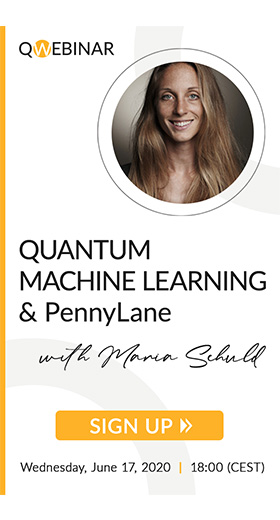Source:
Article web page:
 We invite you to the next QWorld seminar. During this QWebinar, Maria Schuld will talk about different aspects of “variational quantum machine learning algorithms”, including their role in the development of near-term quantum technologies, their interpretation as a cross-breed of neural networks and support vector machines, and strategies of fitting the quantum model to data. As a practical implementation, she will show how to use the open-source software framework “PennyLane” to integrate quantum circuits with machine learning libraries such as PyTorch and Tensorflow.
We invite you to the next QWorld seminar. During this QWebinar, Maria Schuld will talk about different aspects of “variational quantum machine learning algorithms”, including their role in the development of near-term quantum technologies, their interpretation as a cross-breed of neural networks and support vector machines, and strategies of fitting the quantum model to data. As a practical implementation, she will show how to use the open-source software framework “PennyLane” to integrate quantum circuits with machine learning libraries such as PyTorch and Tensorflow.
About the event:
Date: 18:00 (CEST), June 17, 2020.
Registration form: https://cutt.ly/durAoJe
Moderators: Abuzer Yakaryılmaz (QWorld & QLatvia) and Ayşin Taşdelen (QTurkey)
Organizers: Abuzer Yakaryılmaz (QWorld & QLatvia) and Agnieszka Wolska (QWorld)
Application deadline: 18:00 (CEST) on June 17, 2020
About the speaker: Maria Schuld works as a researcher for the Toronto-based quantum computing start-up Xanadu, as well as for the Big Data and Informatics Flagship of the University of KwaZulu-Natal in Durban, South Africa. She received her PhD from the University of KwaZulu-Natal in 2017 for her work on the intersection of quantum computing and machine learning, which was published as the book “Supervised Learning with Quantum Computers” (Springer, 2018, co-authored by F. Petruccione). Besides her physics background Maria has a postgraduate degree in political science, and a keen interest in the interplay of emerging technologies and society.
About QWorld: QWorld is a global network of individuals, groups, and communities collaborating on education and implementation of quantum technologies and research activities. Our main aim is to have an open access and public global ecosystem for quantum technologies and quantum software by the year 2025 so that each interested hardworking individual, group, institute, or region can be easily part of the ecosystem.
